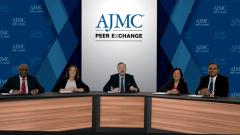
Key Takeaways From Heart Failure Clinical Trials
Heart failure treatment strategies are emphasized based off recent clinical trial data.
Episodes in this series

This is a video synopsis/summary of a panel discussion involving Robert Groves, MD; Eugene E. Wright Jr, MD; Nancy Albert, PhD; Nihar Desai, MD, MPH; and Kelly Marie Axsom, MD. The panel discusses knowing when to deviate from guideline-directed heart failure therapy, emphasizing the expert clinician’s role in individualizing care. Albert notes renal concerns previously limited use of renin-angiotensin-aldosterone system (RAAS) inhibitors and mineralocorticoid receptor antagonists (MRAs), but current evidence shows overall kidney benefits with angiotensin receptor-neprilysin inhibitors (ARNIs) and sodium-glucose cotransporter-2 (SGLT2) inhibitors despite initial changes in function. Understanding drugs’ mechanisms and adverse effect profiles prevents inappropriate discontinuation. Axsom emphasizes how multidisciplinary teams help monitor patients starting new therapies, allowing providers to “ride out” transient changes. Desai stresses that all clinicians should initiate guideline-directed treatments using standard protocols. Axsom reviews data showing the ARNIs (sacubitril-valsartan) reduce mortality by 16% versus angiotensin-converting enzyme (ACE) inhibitors in heart failure with reduced ejection fraction (HFrEF), leading to its favored status. However, it should not be started in unstable, symptomatic patients. Desai adds that this mortality benefit was against active comparators, not placebo, underscoring the need to convert stable ACE inhibitor patients to ARNI therapy. Overall, expertise means maximizing evidence-based therapies through urgent optimization, not just following old habits. But multidisciplinary teams support appropriate individualization when challenges arise.
Video synopsis is AI-generated and reviewed by AJMC editorial staff.
Newsletter
Stay ahead of policy, cost, and value—subscribe to AJMC for expert insights at the intersection of clinical care and health economics.









